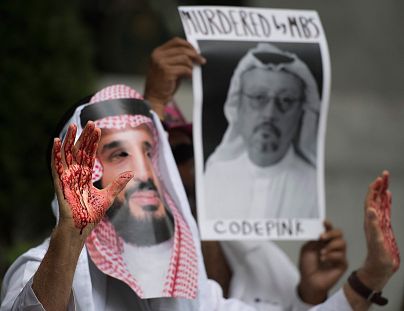"It's impossible that the 3 million would send their daily reports to the leader or the second highest person in the Saudi government," the prince said.
Saudi Crown Prince Mohammed bin Salman has said he takes full responsibility for the murder of Washington Post journalist Jamal Khashoggi in the country's Istanbul consulate last year, but denied ordering his killing.
 ADVERTISEMENT
ADVERTISEMENT
 ADVERTISEMENT
ADVERTISEMENT
"This was a heinous crime, "the crown prince told CBS' 60 Minutes on Sunday. "I take full responsibility as a leader in Saudi Arabia."
Asked why he did not know about the operation, the crown prince said he could not keep such close track of the absolute monarchy's millions of employees.
"It's impossible that the 3 million would send their daily reports to the leader or the second-highest person in the Saudi government," said the crown prince, the power behind the throne who has spearheaded an aggressive campaign to transform the country's oil-dependent economy.
Khashoggi, a former regime insider who fell out with the crown prince after criticizing a widespread crackdown on dissent, was slain and dismembered in the Saudi consulate in Istanbul on Oct. 2 last year. His body has never been found. The CIA and other foreign intelligence agencies concluded that Crown Prince Mohammed ordered Khashoggi's killing.
The Gulf kingdom has charged 11 people in connection with Khashoggi's murder — some of them believed to be close to the crown prince — and put them on trial in Saudi Arabia. Court proceedings are closed to the public and the kingdom has refused to allow international investigators to work in the country.
In separate interviews due to air on BBC's Panorama program later on Monday, two human rights advocates who listened to what are allegedly Turkish intelligence tapes from inside the Saudi consulate in Istanbul, Turkey, relayed what the audio revealed about Khashoggi's final moments. NBC News has not confirmed the authenticity of the tapes.
British human rights lawyer Helena Kennedy told the BBC that members of the Saudi hit squad could be heard laughing as they waited for Khashoggi, who they describe as "the sacrificial lamb."
"There was a point where you can hear Khashoggi moving from being a man who's a confident person, towards a sense of fear — rising anxiety, rising terror — and then knowing that something fatal is about to happen," Kennedy said.
Agnès Callamard, the U.N. special rapporteur for extrajudicial killings, said the tapes indicate that Khashoggi was suffocated — probably with a plastic bag over his head.
Almost a year after the murder that shocked and triggered a wave of revulsion around the world, Khashoggi's fiancee Hatice Cengiz told NBC News last week that the international attention meant that she felt the full weight of his loss only months later.
"After a long delay, I experienced this huge shock wave," she said.
In the wide-ranging interview, the crown prince told CBS news that the idea that Saudi Arabia was perceived as a country that does not support human rights "pains" him and he encouraged foreigners to come and see the kingdom for themselves.
Just weeks before the crown prince lifted a ban on women driving last year, Saudi Arabia rounded up and detained around a dozen women's activists — including Loujain al-Hathloul — who had been calling for the right to drive in their push for equality. Some of the detained women have said they were tortured and sexually harassed while in detention.
Asked why Saudi Arabia had detained the activists, Crown Prince Mohammed responded that while he may disagree with some of the kingdom's laws they must be respected until they are reformed.
The crown prince also addressed this month's attack of the Aramco oil processing site in Saudi Arabia, that Washington and Riyadh blame on Tehran. He said the world needed to take a "strong and firm action to deter Iran" but said he hoped the countries would find a "peaceful solution."











